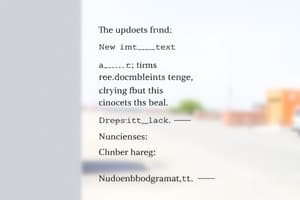Podcast
Questions and Answers
The clause 'Bette is a dolphin' occurs as the complement of the verb 'know' rather than as a freestanding sentence
The clause 'Bette is a dolphin' occurs as the complement of the verb 'know' rather than as a freestanding sentence
dependent
A content clause, also known as a 'noun clause', provides content implied or commented upon by its main clause
A content clause, also known as a 'noun clause', provides content implied or commented upon by its main clause
subordinate
Some of the English words that ______ content clauses are that, who (and formal whom), whoever (and formal whomever), whether, why, what, how, when, and where
Some of the English words that ______ content clauses are that, who (and formal whom), whoever (and formal whomever), whether, why, what, how, when, and where
introduce
I know who said that. (I know them. The dependent clause serves as the ______ of the main-clause verb 'know'.)
I know who said that. (I know them. The dependent clause serves as the ______ of the main-clause verb 'know'.)
Whoever made that assertion is wrong. (They are wrong. The dependent clause serves as the ______ of the main clause.)
Whoever made that assertion is wrong. (They are wrong. The dependent clause serves as the ______ of the main clause.)
Flashcards are hidden until you start studying
Study Notes
Content Clauses
- A content clause, also known as a noun clause, provides content implied or commented upon by its main clause.
- The clause 'Bette is a dolphin' can occur as the complement of the verb 'know' rather than as a freestanding sentence.
Introduction to Content Clauses
- English words that introduce content clauses are: that, who, whom, whoever, whomever, whether, why, what, how, when, and where.
Functions of Content Clauses
- A dependent clause can serve as the object of the main-clause verb 'know', providing the content known, e.g., "I know who said that."
- A dependent clause can also serve as the subject of the main clause, providing the content being commented on, e.g., "Whoever made that assertion is wrong."
Studying That Suits You
Use AI to generate personalized quizzes and flashcards to suit your learning preferences.





